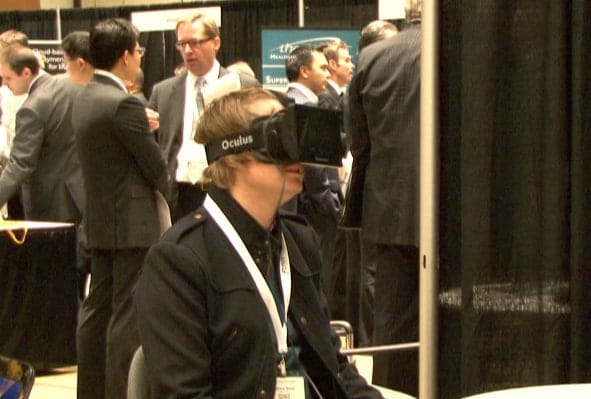
Oculus Rift at the Cantech Investment Conference, January 16th in Toronto. One of the more head-turning trade show booths at last month’s Cantech Investment Conference was occupied by Oculus Rift, a California-based maker of virtual reality headgear.
On the conference floor, reserved business types were heard to exclaim, “Whoa!” as they reacted to the disorienting landscape coming at them through a screen strapped to their head. Oculus Rift was at the conference because of a recent investment made by emerging Ontario-based tech fund Pycap Venture Partners.
Oculus Rift has just unveiled a movie-like trailer on the Reelhouse platform, a Vancouver-based film distributor with roots in the start-up community. The trailer is for an immersive virtual reality game called “Zero Point”.
Billed as “the first 3D 360 degree movie created for virtual reality”, “Zero Point’s” trailer triggers the kind of vertigo-inducing feeling that you can only get when you think you’ve seen the future. Recent developments in 4K ultra-high definition TV can produce the same effect, like you’re staring through a window, rather than at a mere TV monitor.
What the trailer also hints at is the eventual future of media, in which the type of first-person agency now taken for granted by gamers begins to gain traction in filmmaking and television, which has up until now existed as a firmly 2D spectator sport best experienced from the safe perspective of the couch.
_______________________________________________________________________________________________________________________
This article is brought to you by Canada’s first publicly traded 3D Printing company, Tinkerine Studios (TSXV:TTD). Click here to learn more.
________________________________________________________________________________________________________________________
Aside from the immersion, “Zero Point” promises to allow the viewer to control point-of-view, in this case using a mouse, though it seems likely that future iterations could incorporate wearable technology, such as Thalmic Labs’ Myo wristband or Bionym’s Nymi bracelet. It sounds, once again, like we’re all heading towards a media future in which linear 2D viewing, not to mention time and space, is abandoned in favour of a first-person subjective experience of virtual reality.
But for all the hype around building a future in which all media is immersive and much of reality virtual, it’s worth remembering that we’ve seen this movie before. In the early 1990s, during the cyberpunk era in which writers like William Gibson painted a portrait of a future dystopia that resembled The Matrix, virtual reality was all anyone could talk about when referring to the year 2000 and beyond. And this was before the widespread arrival of the Internet.
Since then, we’ve witnessed the apparent failure by consumers to adopt 3D television, probably hampered at least as much by the financial collapse of 2008 as by any distaste for the technology. And now, with 4K being pushed as the next frontier, people are being asked once again to abandon their old flatscreen TVs in favour of the cool new thing, so soon after relegating their analogue cathode ray TVs to mass graves in landfills and Chinese metal salvaging operations.
The technology’s next major obstacle lies in pushing against the limits of what most people are comfortable with. What we’ve seen instead of the widespread adoption of the free, open Internet as a means of connecting the global village and empowering individuals has been the enthusiastic embrace of social media by individuals and the eager transformation of virtual space by private interests as a vehicle for advertising. It may be that the enthusiastic embrace by most people of “second screen” experiences while watching their primary TVs is as far as they’re willing to go. Basically, people just want to tweet with their friends while watching the game.
Which future ends up playing out in the end, though, will depend on consumers’ willingness to embrace technologies like those developed by Oculus Rift. Their success is as reliable a barometer as we’re likely to find on whether an old-new technology like virtual reality is likely to gain any traction in the wider world.
Zero Point Official Trailer from Condition One on Vimeo.
________________________________________________________________________________________________________________
Leave a Reply
You must be logged in to post a comment.




 Share
Share Tweet
Tweet Share
Share




Comment